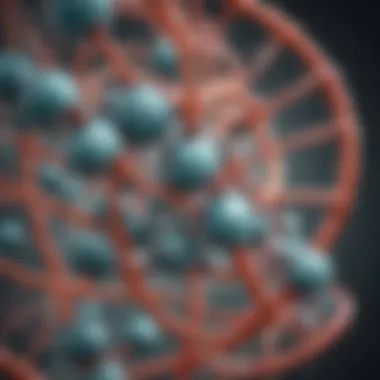Exploring Na+,K+-ATPase Antibodies: Mechanisms & Implications


Intro
The Na+,K+-ATPase enzyme holds a vital position in maintaining cellular homeostasis. It is crucial for transporting sodium and potassium ions across the cell membrane. This transport process is essential for numerous physiological functions, including nutrient uptake, cell volume regulation, and the generation of action potentials in neurons. Recently, research has turned its attention to Na+,K+-ATPase antibodies. These antibodies can modulate the activity of the enzyme and offer significant insights into both health and disease.
This exploration aims to scrutinize the biochemical essence of Na+,K+-ATPase antibodies, as well as their therapeutic applications and implications in various diseases. Understanding these antibodies could unveil new pathways for treatment and diagnostic measures in clinical practice.
Key Findings
Summary of the main results
Research has indicated that Na+,K+-ATPase antibodies can bind to different sites on the Na+,K+-ATPase enzyme. This binding can either augment or inhibit enzyme activity. Recent investigations have shown that certain isoforms of these antibodies have higher affinities for specific regions of the enzyme, influencing its activity significantly. Experimental results often indicate a correlation between the levels of these antibodies and various pathophysiological states.
Significance of findings within the scientific community
The implications of this research are substantial. Understanding how Na+,K+-ATPase antibodies function contributes to our broader comprehension of ion channel biology. These findings are crucial for developing strategies that utilize these antibodies in diagnostic or therapeutic contexts. As scientists continue to explore the mechanisms underlying antibody interactions, there may be further revelations about their roles in conditions like heart failure, hypertension, and even neurodegenerative diseases.
Implications of the Research
Applications of findings in real-world scenarios
The potential applications of Na+,K+-ATPase antibodies extend into both research and clinical fields. For instance, they may serve as biomarkers for specific diseases, facilitating early detection and personalized treatment approaches. Moreover, the modulation of Na+,K+-ATPase activity by these antibodies can lead to new therapeutic strategies. This modulation may help in addressing disorders characterized by dysfunctional ion transport.
Potential impact on future research directions
Future research may benefit from investigating the diverse roles of Na+,K+-ATPase antibodies in various cell types. Additionally, exploring the development of antibody-based therapeutics could open new avenues for treatment. As understanding deepens, we may witness innovations that combine antibody therapy with existing treatment modalities, thus enhancing patient outcomes.
"The study of Na+,K+-ATPase antibodies is just at the beginning, but its implications could reshape our understanding of cellular physiology and therapeutic intervention."
Prologue to Na+,K+-ATPase Antibodies
Understanding Na+,K+-ATPase antibodies is critical for both fundamental and applied biomedical research. These antibodies, which target the Na+,K+-ATPase enzyme, play a significant role in various physiological and pathological processes. Their importance extends beyond the mere identification of the enzyme to encompass deeper aspects of cellular functions and disease mechanisms.
It's essential to grasp the multifaceted nature of Na+,K+-ATPase antibodies to fully appreciate their relevance in medical settings. From exploring ionic balance to acting as potential biomarkers in disorders, the implications of these antibodies are profound. As we unfold this topic, we will highlight not only the biochemical characteristics of Na+,K+-ATPase antibodies but also their historical context, setting the stage for more in-depth discussions on their clinical applications and importance.
Definition and General Function
Na+,K+-ATPase antibodies are specific proteins that bind to the Na+,K+-ATPase enzyme. This enzyme plays a crucial role in maintaining the electrochemical gradients of sodium and potassium ions across the plasma membrane of cells. By actively transporting sodium out and potassium into the cell, it contributes to several vital processes such as nutrient uptake, cell volume regulation, and electrical excitability. Without Na+,K+-ATPase, cells would struggle to maintain homeostasis, leading to potential cellular dysfunction.
The interaction of antibodies with Na+,K+-ATPase can indicate several changes in cellular physiology and has implications in various medical conditions. Furthermore, understanding these antibodies' functions aids researchers and clinicians in better diagnosing and treating diseases.
Historical Perspective
The study of Na+,K+-ATPase antibodies traces back several decades. Initial discoveries related to the enzyme itself laid the groundwork for exploring these antibodies. The 1950s and 1960s marked significant advances in our understanding of the enzyme's structure and function, leading to the realization that antibodies could serve as useful tools in research.
As research evolved, so did interest in the pathological implications of Na+,K+-ATPase antibodies. In the 1980s, mounting evidence indicated links between these antibodies and various autoimmune diseases. This sparked an increased focus on the clinical significance of such antibodies as biomarkers.
Today, ongoing advances in immunology and biochemistry broaden our understanding of Na+,K+-ATPase antibodies, increasingly leading to new applications in diagnostics and therapeutics.


Biochemical Characteristics of Na+,K+-ATPase
The Na+,K+-ATPase enzyme is a critical component of cellular physiology that plays a vital role in maintaining ion homeostasis. Understanding its biochemical characteristics provides insights into its complex functions and significance in health and disease. This knowledge is essential for recognizing the potential impact of Na+,K+-ATPase antibodies in various applications.
Structure of Na+,K+-ATPase
Na+,K+-ATPase is a membrane-bound enzyme composed of multiple subunits, most notably the alpha (α) and beta (β) subunits. The alpha subunit is responsible for the enzyme's catalytic activity, while the beta subunit plays a supportive role in transporting and stabilizing the enzyme complex within the cell membrane. The enzyme typically functions as a hetero-oligomer, meaning it exists as a combination of different subunit types.
The essential feature of the structure is the availability of binding pockets for Na+ and K+ ions, which are critical for its function. This unique structural arrangement allows the enzyme to use energy derived from ATP hydrolysis to pump out three sodium ions from inside the cell while importing two potassium ions in return. This creates an electrochemical gradient vital for various cellular functions, including nerve impulse transmission and muscle contraction.
Mechanism of Action
The operation of Na+,K+-ATPase can be summarized in several clear steps:
- Binding of Ions: The enzyme first binds three sodium ions from the intracellular space.
- Phosphorylation: ATP hydrolysis leads to the phosphorylation of the alpha subunit, resulting in a conformational change
- Release of Sodium: The conformational change causes the release of sodium ions outside the cell.
- Binding of Potassium: Two potassium ions then bind from the extracellular space.
- Dephosphorylation: The enzyme is dephosphorylated, prompting it to return to its original form, bringing potassium ions inside the cell.
The efficiency and precision of this mechanism are vital for sustaining cellular activities, making Na+,K+-ATPase a focal point of many medical studies.
Role in Ion Transport
The primary role of Na+,K+-ATPase in ion transport cannot be overstated. It is responsible for setting up the vital sodium and potassium gradients across cell membranes. These gradients create an electrochemical potential necessary for numerous physiological processes. For instance, the action potential in neurons relies on changes in ion concentrations facilitated by Na+,K+-ATPase, allowing for signal transmission and cellular communication.
Moreover, the enzyme is also involved in regulating cell volume and maintaining osmotic balance, essential for proper cellular function.
In summary, the biochemical characteristics of Na+,K+-ATPase highlight its importance in maintaining cellular homeostasis. By examining the structure, mechanism of action, and role in ion transport, we gain a deeper understanding of why Na+,K+-ATPase antibodies are of significant interest in both diagnostic and therapeutic contexts.
Production of Na+,K+-ATPase Antibodies
The production of Na+,K+-ATPase antibodies is a crucial element of both basic research and clinical diagnostics. These antibodies offer insights into the function and regulation of the Na+,K+-ATPase enzyme, which is essential for cellular homeostasis. Understanding how these antibodies are generated, characterized, and utilized can shed light on their roles in immunological responses and their therapeutic potential.
Generating Na+,K+-ATPase antibodies involves sophisticated techniques that ensure specificity and effectiveness. This process parallels the increasing need for targeted therapies and diagnostics in medicine. By exploring how these antibodies are produced, researchers can identify better strategies for dealing with autoimmune diseases, cardiovascular issues, and neurological disorders.
Additionally, the growing body of evidence surrounding the link between Na+,K+-ATPase antibodies and various diseases underscores the importance of this topic. Antibody production can be an indispensable tool for understanding disease mechanisms.
Methods of Antibody Generation
The methods utilized for generating Na+,K+-ATPase antibodies primarily fall under two categories: polyclonal and monoclonal antibody generation. Each approach has its merits and limitations.
- Polyclonal Antibodies are produced by immunizing a host animal, typically rabbits or goats, with a specific antigen derived from the Na+,K+-ATPase protein. The immune response generates a heterogeneous mixture of antibodies that can recognize different epitopes of the antigen. This diversity can be beneficial, as it allows researchers to detect variations in the enzyme across different conditions.
- Monoclonal Antibodies are derived from a single clone of B cells. After immunization, B cells producing the desired antibody are fused with myeloma cells to create hybridomas. These hybridomas proliferate indefinitely, offering a consistent and specific antibody source. Monoclonal antibodies provide high specificity, which is particularly valuable when precise targeting is necessary for diagnostic or therapeutic applications.
Characterization Techniques
Characterizing Na+,K+-ATPase antibodies is critical for determining their suitability for specific applications. Various techniques are employed for this purpose:
- Western Blotting: This technique allows for the identification of proteins within a sample. It provides information about the size and quantity of Na+,K+-ATPase and demonstrates the specificity of the generated antibodies.
- Immunohistochemistry (IHC): This method uses antibodies to detect specific antigens in tissue sections. It allows researchers to visualize the localization of Na+,K+-ATPase in cellular contexts, revealing insights into its role in health and disease.
- ELISA (Enzyme-Linked Immunosorbent Assay): This widely used assay quantifies the presence of antibodies in serum or other biological fluids. It helps assess the immune response against Na+,K+-ATPase, providing information on its relevance to various diseases.
"Characterization of Na+,K+-ATPase antibodies is fundamental for ensuring that these tools are reliable and effective in research and clinical settings."
Using these characterization techniques enhances the reliability of data generated in experimental and clinical contexts. This ensures the antibodies produced are well-suited for their intended applications, ultimately supporting advances in medical research and potential therapies.


Pathophysiological Implications of Na+,K+-ATPase Antibodies
The Na+,K+-ATPase enzyme plays a vital role in maintaining ionic homeostasis within cells. Its involvement in multiple physiological processes makes it crucial when discussing various pathophysiological conditions. Na+,K+-ATPase antibodies are linked to significant health issues, shedding light on autoimmune conditions, cardiovascular diseases, and neurological disorders. The examination of these antibodies provides insightful perspectives on disease mechanisms and potential therapeutic strategies.
Autoimmune Conditions
Autoimmune diseases occur when the immune system mistakenly attacks the body’s own tissues. In some cases, Na+,K+-ATPase antibodies act as markers for autoimmune responses. Disorders such as autoimmune thyroiditis and lupus erythematosus show increased levels of these antibodies. Their presence indicates a disruption in normal immune regulation. Understanding the role of these antibodies in autoimmune conditions helps in diagnostics and informs treatment approaches. By recognizing the correlation between Na+,K+-ATPase and autoimmunity, researchers can develop targeted therapies that restore immune balance.
Cardiovascular Diseases
The heart relies heavily on Na+,K+-ATPase for maintaining cellular ion gradients, which are essential for muscle contraction and overall cardiac function. Abnormal Na+,K+-ATPase antibody levels can lead to disturbances in heart activity. Conditions such as heart failure and ischemic heart disease may correlate with these antibody levels. Studies suggest that modulating Na+,K+-ATPase activity can serve as a therapeutic direction, potentially improving heart function. The implications of these antibodies in cardiovascular health are critical, requiring further research to clarify their roles and potential interventions.
Neurological Disorders
A significant body of evidence links Na+,K+-ATPase dysregulation to various neurological disorders. In conditions such as multiple sclerosis and Parkinson's disease, altered Na+,K+-ATPase activity influences neuronal excitability and survival. Anti-Na+,K+-ATPase antibodies can affect neurotransmission and contribute to neuronal damage. Understanding their mechanisms expands the possible avenues for treatment. This insight may enable the development of novel therapies that target these antibodies, potentially benefiting patients suffering from chronic neurological diseases.
"The interaction of Na+,K+-ATPase antibodies with cellular mechanisms is not just a matter of scholarly interest; it holds real promise for impacting patient care across multiple domains."
Each of these areas—autoimmunity, cardiovascular health, and neurology—reveals the complexity of Na+,K+-ATPase antibodies and their implications for health. This comprehensive understanding facilitates further advances in the field, enhancing both diagnostic and therapeutic capacities.
Clinical Applications of Na+,K+-ATPase Antibodies
The clinical applications of Na+,K+-ATPase antibodies highlight their significance in both diagnostic and therapeutic contexts. As research progresses, understanding the roles of these antibodies in various health conditions becomes crucial. Not only do they serve as valuable diagnostic tools, but they also hold potential for therapeutic interventions. This dual functionality indicates how these antibodies can enhance patient outcomes through various pathways.
Diagnostic Tools
Na+,K+-ATPase antibodies can be utilized in diagnostic settings, offering insights into underlying pathologies. For instance, elevated levels of these antibodies might point towards autoimmune responses or dysfunctions tied to this essential enzyme. In conditions like autoimmune diseases, testing for specific Na+,K+-ATPase antibodies could provide clarity regarding disease mechanisms.
Additionally, these antibodies can be crucial in identifying specific diseases at an early stage. Their presence is being studied in relation to cardiovascular diseases and certain neurological disorders. Diagnostic tests involving Na+,K+-ATPase antibodies can aid medical professionals in decisions regarding treatment strategies. Key benefits include:
- Early Detection: Identifying disease markers before symptoms manifest.
- Targeted Therapies: Guiding treatment choices based on antibody profiles.
- Monitoring Progress: Tracking levels during treatment for better management.
Therapeutic Potential
The therapeutic potential of Na+,K+-ATPase antibodies is an emerging area of research. Current studies explore how these antibodies can be harnessed to develop new treatment modalities. By targeting the Na+,K+-ATPase enzyme, researchers aim to influence ion transport processes, which are vital for cellular function. This could open avenues for treating conditions like heart failure or neurodegenerative disorders
Moreover, there are ideas about deploying these antibodies in drug delivery systems. They may help in transferring therapeutic agents precisely to targeted cells that express Na+,K+-ATPase, thus improving drug efficacy and reducing side effects. Some potential therapeutic applications are:
- Autoimmune Therapy: Reducing unwanted immune responses in specific conditions.
- Cardiovascular Interventions: Enhancing heart function in heart failure patients.
- Neuroprotective Strategies: Offering protection in neurodegeneration by modulating ion balance.
In the clinical landscape, integrating Na+,K+-ATPase antibodies into practice may require rigorous validation. Safety and efficacy will be important factors before widespread use can occur. The future looks promising, but challenges like specificity and regulatory approvals must be addressed.
Research Advances Involving Na+,K+-ATPase Antibodies
Research on Na+,K+-ATPase antibodies has grown significantly in recent years, shedding light on their biochemical and clinical relevance. Understanding these advances is essential for students, researchers, and medical professionals exploring new therapeutic options. The findings not only pinpoint mechanisms by which these antibodies interact with the Na+,K+-ATPase enzyme but also reveal their implications across multiple diseases. This section covers recent discoveries and envisages future directions in the study of Na+,K+-ATPase antibodies.
Recent Discoveries
Recent studies have expanded the knowledge base regarding the interactions between Na+,K+-ATPase antibodies and various cellular mechanisms. One critical discovery is the identification of specific epitopes on the Na+,K+-ATPase protein that trigger autoimmune responses. By utilizing advanced imaging techniques and molecular biology methods, researchers are uncovering how these antibodies can alter ion flux and disrupt cellular homeostasis.


Another significant finding is the role of these antibodies in neurodegenerative diseases. For example, research has shown that Na+,K+-ATPase antibodies may contribute to neuronal death in Alzheimer's disease by impairing cellular signaling pathways. This connection opens avenues for potential diagnostic markers to monitor disease progression.
Moreover, researchers are also exploring the relationship between Na+,K+-ATPase antibodies and cardiovascular health. Recent studies observe that an increase in specific antibody titers correlates with hypertension and heart failure. This correlation is driving the search for new therapies aimed at neutralizing harmful antibody effects. Understanding these developments is vital for integrating these antibodies in clinical settings.
Future Directions
The future of research on Na+,K+-ATPase antibodies appears promising. As advancements in biotechnology continue, several pivotal directions for upcoming studies emerge.
One approach is the development of monoclonal antibodies specifically designed to target the Na+,K+-ATPase enzyme without unintended effects. This endeavor could lead to innovative therapeutic strategies for conditions linked with these antibodies, particularly in autoimmune and cardiovascular diseases.
Another essential future pathway involves investigating the signaling pathways activated by Na+,K+-ATPase antibodies. Understanding these pathways may unlock novel targets for drug development. Furthermore, exploiting the high affinity of certain antibodies to develop immunodiagnostic assays could greatly enhance early detection and monitoring methods for related diseases.
Overall, the ongoing research not only emphasizes the critical biochemical roles of Na+,K+-ATPase antibodies but also highlights their potential as therapeutic agents. Collaboration among biomedical scientists, clinicians, and policymakers is vital to make strides in this field to maximize the benefits of these research advancements.
"The expanding landscape of Na+,K+-ATPase antibody research not only provides new insight into disease mechanisms but also paves the way for innovative diagnostic and therapeutic strategies."
In summary, the research advances involving Na+,K+-ATPase antibodies are shaping a new frontier in biomedical science, bridging the gap between fundamental research and clinical application.
Challenges in Na+,K+-ATPase Antibody Research
The research surrounding Na+,K+-ATPase antibodies presents a complex landscape filled with numerous challenges that can affect their application and efficacy. Understanding these challenges is crucial for advancing the field. The benefits of recognizing these obstacles include enhanced experimental design, improved therapeutic strategies, and increased reliability of diagnostic tools. Several specific issues merit attention, notably specificity and sensitivity in antibody assays and regulatory considerations surrounding their use in clinical settings.
Specificity and Sensitivity Issues
One prominent challenge in the research of Na+,K+-ATPase antibodies is the specificity and sensitivity of the antibodies themselves. The human immune response can generate antibodies against a variety of epitopes that may not always be exclusive to Na+,K+-ATPase. This cross-reactivity can lead to false positives in assays, complicating interpretations of results. Furthermore, sensitivity varies among different methods employed to detect these antibodies, which can contribute to discrepancies in data collected across various studies.
Researchers must find a delicate balance in developing antibodies that exhibit high affinity for their target while minimizing non-specific interactions. Specificity tests often involve using knockout models or cell lines treated to express varying Na+,K+-ATPase isoforms, aiding in the identification of the most effective antibodies for diagnostic or therapeutic purposes. However, this process can be time-consuming and resource-intensive.
Regulatory Considerations
Another crucial factor impacting Na+,K+-ATPase antibody research is regulatory considerations. In many regions, the introduction of new antibodies into clinical practice requires thorough validation and adherence to strict guidelines set by regulatory bodies. These regulations ensure that the antibodies used for diagnostics or treatment are safe and effective; however, they can also lead to increased complexity and delays in research progression.
For researchers, understanding the regulatory landscape is essential. Navigating the approval processes requires significant financial and temporal resources. This may deter smaller laboratories or institutions from pursuing potentially groundbreaking research in this area. As such, staying informed about regulatory changes and maintaining compliance while pushing the boundaries of research is vital for the advancement of Na+,K+-ATPase antibodies.
"Navigating regulatory frameworks is as essential as the science itself; it defines the pathway from lab bench to patient care."
In summary, addressing challenges related to specificity and sensitivity as well as understanding regulatory considerations will greatly enhance the overall impact of Na+,K+-ATPase antibody research. Active engagement with these issues can lead to more robust findings, ultimately benefiting diagnostic and therapeutic applications in various medical domains.
Closure
The conclusion of this article encapsulates the essential insights gained from exploring Na+,K+-ATPase antibodies. Establishing a clear understanding of Na+,K+-ATPase and its antibodies is critical. These elements play a significant role in cellular processes, impacting health and disease. A strong grasp of these components leads to greater appreciation for their biochemical mechanisms and clinical applications.
Summary of Findings
The findings presented throughout this article reveal multiple layers of complexity surrounding Na+,K+-ATPase antibodies. Key points include:
- Biochemical Roles: Na+,K+-ATPase is vital in maintaining ion gradients, which are essential for various cellular functions.
- Pathophysiological Implications: These antibodies could be influential in autoimmune conditions, cardiovascular diseases, and neurological disorders, revealing their potential diagnostic and therapeutic role.
- Production and Characterization: Understanding the methods for generating and characterizing these antibodies can enhance their usage in research and clinical settings.
- Research Advances: Recent discoveries suggest new frontiers in utilizing Na+,K+-ATPase antibodies for innovative diagnostic and therapeutic strategies.
Overall, it can be noted that the scientific community continues to investigate the multifaceted roles of these antibodies. With ongoing research, further developments are expected in their applications.
Implications for Future Research
Future research involving Na+,K+-ATPase antibodies should address several critical elements. For example:
- Novel Therapeutics: Investigating how these antibodies can act as novel therapeutics for various conditions could yield significant advancements.
- Improving Specificity: Enhancing the specificity and sensitivity of these antibodies is paramount for accurate diagnostics and targeted therapies.
- Understanding Mechanisms: Further studies need to focus on the underlying mechanisms by which these antibodies interact with the Na+,K+-ATPase enzyme.
- Longitudinal Studies: Long-term studies investigating patient outcomes related to these antibodies can provide insightful data for clinical practices.
By delving deeper into these areas, researchers can better understand Na+,K+-ATPase antibodies and their pivotal roles in health and disease, thereby unlocking new horizons in medical science.







